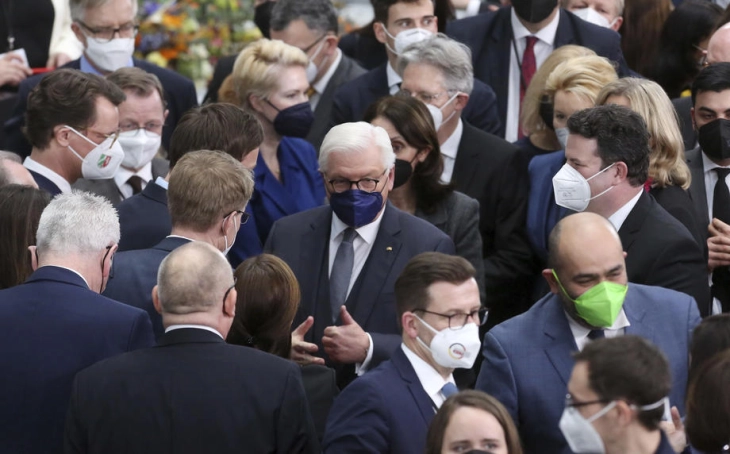Germany's Steinmeier appeals to Putin after re-election as president

Berlin, 13 February 2022 (dpa/MIA) - German President Frank-Walter Steinmeier was re-elected for a second term in office in the first round of voting on Sunday.
He received 1,045 out of 1,437 votes cast at an extraordinary meeting of the Federal Convention, Bundestag President Bärbel Bas confirmed.
Steinmeier used the occasion to appeal to Russian President Vladimir Putin to de-escalate tensions over Ukraine.
The Russian leader has been accused of planning an incursion into eastern Ukraine in the near future after weeks of warnings over a massive troop build-up along the countries' shared border.
"I appeal to President Putin to loosen the noose around Ukraine's neck and join us in seeking a way to preserve peace in Europe," Steinmeier said in Berlin.
Putin should not make the mistake of underestimating the strength of democracy, Steinmeier added in his address.
The politician also referred to the pandemic's impact on German democracy.
"The pandemic has inflicted deep wounds on our society. And I want to help heal these wounds," he said. "But, ladies and gentlemen, I have yet to encounter an authoritarian system that would have come through this crisis better."
Veteran politician and Social Democrat Steinmeier, 66, received the backing of all three parties in the German coalition government, weeks ahead of Sunday's sitting of the Federal Convention.
The conservative opposition has also given its support to Steinmeier, a former foreign minister and former vice chancellor, meaning that his re-election in the first round of voting had been a foregone conclusion.
The post of federal president is a mainly ceremonial one in Germany, but the holder signs bills into law, is frequently on the public stage inside and outside the country, and speaks on current political issues.
During his first term in office, Steinmeier championed liberal democracy in Germany and during trips abroad. He called for dialogue between opponents on the most sensitive issues of the day, including recently plans for compulsory vaccination against the coronavirus.
A recent opinion poll indicated that 85% of the German population thought he was doing a good job.
The Federal Convention, this year numbering some 1,472 members, comes together for the sole purpose of choosing a president.
Half of the body comprises members of parliament, and half comprise representatives sent by Germany's 16 states. The national football coach, Hansi Flick, is among those invited this year.
Three other candidates had been nominated for the presidency: left-winger Gerhard Trabert; physicist Stefanie Gebauer who was nominated by a political group called the Free Voters; and the arch-conservative Max Otte.
The nomination of Otte, a member of the Christian Democrats (CDU), by the far-right Alternative for Germany (Afd) party caused a furore in the CDU, a mainstream centre-right party that has tried hard to distance itself from the nationalists.
The size of the gathering and coronavirus restrictions mean that there is not enough space in the usual Reichstag parliament building for the meeting. It was therefore being held in the nearby Paul Löbe House, with some participants taking part via video link from different rooms.







